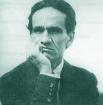

Lincoln and Vallejo: separated at birth?
***
Five talking points about César Vallejo.
1) There's the inexplicable mystery of how and why he realized that he could be César Vallejo. That is, speak with such an unmistakably individual voice. What gave him that courage? (Normally I hate to apply the word courage to writing in a particular style; it seems fake and inappropriate to say that it is courageous for me to write in a particular way. For Vallejo, though, this is entirely approrpriate.)
2) He had a complete poetic language, ranging from the colloquial to the erudite, the Quechua-inflected Spanish that he grew up speaking to the avant-garde cosmopolitan discourse of Europe.
3) He had a unique way of bridging the individual and the collective voice. "Yo no siento este dolor como César Vallejo." Yet it took "César Vallejo" to articulate this insight.
4) He passed through the historical avant-gardes and forged a style of political poetry totally inflected by the freedom given to him by this avant-garde. He never practiced a sort of "generic" avant-garde style. Unlike Neruda, he never did generic "political poetry" either.
5) His appeal is immediate and direct. You know that it's great before you even understand what it's all about. Further study only deepens our appreciation.
4 comentarios:
Yep. I'd love to hear more....
Vallejo's poetry is strinking and powerful in many ways. A former teacher of mine suggested his work to me. At the time, I had never heard of Vallejo. Now, he is one of the poets I cannot imagine living without. I have a couple of smallish volumes of his, but that is all I have ever found. Courage is the right word for what he had.
That should be striking, not strinking. Not sure what strinking is.
Plus, he's a poet who only seemed to improve w/ age. The poems he wrote in Paris near the end of his life are even more impressive if one considers how desperate his economic situation was in Europe.
Vallejo at times makes Neruda seem quaint.
Publicar un comentario